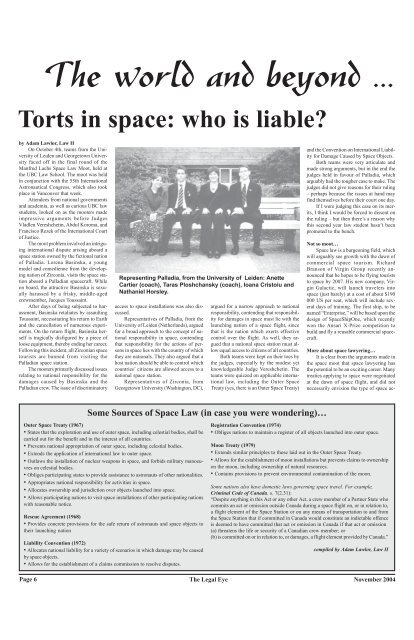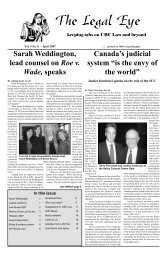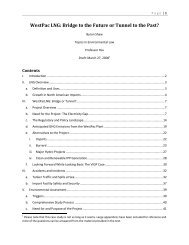The Legal Eye - Faculty.law.ubc.ca - University of British Columbia
The Legal Eye - Faculty.law.ubc.ca - University of British Columbia
The Legal Eye - Faculty.law.ubc.ca - University of British Columbia
Create successful ePaper yourself
Turn your PDF publications into a flip-book with our unique Google optimized e-Paper software.
<strong>The</strong> world and beyond ...<br />
Torts in space: who is liable?<br />
by Adam Lawlor, Law II<br />
On October 4th, teams from the <strong>University</strong><br />
<strong>of</strong> Leiden and Georgetown <strong>University</strong><br />
faced <strong>of</strong>f in the final round <strong>of</strong> the<br />
Manfred Lachs Space Law Moot, held at<br />
the UBC Law School. <strong>The</strong> moot was held<br />
in conjunction with the 55th International<br />
Astronauti<strong>ca</strong>l Congress, which also took<br />
place in Vancouver that week.<br />
Attendees from national governments<br />
and a<strong>ca</strong>demia, as well as curious UBC <strong>law</strong><br />
students, looked on as the mooters made<br />
impressive arguments before Judges<br />
Vladlen Vereshchetin, Abdul Koroma, and<br />
Francisco Rezek <strong>of</strong> the International Court<br />
<strong>of</strong> Justice.<br />
<strong>The</strong> moot problem involved an intriguing<br />
international dispute arising aboard a<br />
space station owned by the fictional nation<br />
<strong>of</strong> Palladia. Lorena Basinska, a young<br />
model and comedienne from the developing<br />
nation <strong>of</strong> Zirconia, visits the space station<br />
aboard a Palladian spacecraft. While<br />
on board, the attractive Basinska is sexually<br />
harassed by a frisky, middle-aged<br />
crewmember, Jacques Toussaint.<br />
After days <strong>of</strong> being subjected to harassment,<br />
Basinska retaliates by assaulting<br />
Toussaint, necessitating his return to Earth<br />
and the <strong>ca</strong>ncellation <strong>of</strong> numerous experiments.<br />
On the return flight, Basinska herself<br />
is tragi<strong>ca</strong>lly disfigured by a piece <strong>of</strong><br />
loose equipment, thereby ending her <strong>ca</strong>reer.<br />
Following this incident, all Zirconian space<br />
tourists are banned from visiting the<br />
Palladian space station.<br />
<strong>The</strong> mooters primarily discussed issues<br />
relating to national responsibility for the<br />
damages <strong>ca</strong>used by Basinska and the<br />
Palladian crew. <strong>The</strong> issue <strong>of</strong> discriminatory<br />
access to space installations was also discussed.<br />
Representatives <strong>of</strong> Palladia, from the<br />
<strong>University</strong> <strong>of</strong> Leiden (Netherlands), argued<br />
for a broad approach to the concept <strong>of</strong> national<br />
responsibility in space, contending<br />
that responsibility for the actions <strong>of</strong> persons<br />
in space lies with the country <strong>of</strong> which<br />
they are nationals. <strong>The</strong>y also argued that a<br />
host nation should be able to control which<br />
countries’ citizens are allowed access to a<br />
national space station.<br />
Representatives <strong>of</strong> Zirconia, from<br />
Georgetown <strong>University</strong> (Washington, DC),<br />
Outer Space Treaty (1967)<br />
• States that the exploration and use <strong>of</strong> outer space, including celestial bodies, shall be<br />
<strong>ca</strong>rried out for the benefit and in the interest <strong>of</strong> all countries.<br />
• Prevents national appropriation <strong>of</strong> outer space, including celestial bodies.<br />
• Extends the appli<strong>ca</strong>tion <strong>of</strong> international <strong>law</strong> to outer space.<br />
• Out<strong>law</strong>s the installation <strong>of</strong> nuclear weapons in space, and forbids military manoeuvres<br />
on celestial bodies.<br />
• Obliges participating states to provide assistance to astronauts <strong>of</strong> other nationalities.<br />
• Appropriates national responsibility for activities in space.<br />
• Allo<strong>ca</strong>tes ownership and jurisdiction over objects launched into space.<br />
• Allows participating nations to visit space installations <strong>of</strong> other participating nations<br />
with reasonable notice.<br />
Rescue Agreement (1968)<br />
• Provides concrete provisions for the safe return <strong>of</strong> astronauts and space objects to<br />
their launching nation<br />
Liability Convention (1972)<br />
• Allo<strong>ca</strong>tes national liability for a variety <strong>of</strong> scenarios in which damage may be <strong>ca</strong>used<br />
by space objects.<br />
• Allows for the establishment <strong>of</strong> a claims commission to resolve disputes.<br />
Representing Palladia, from the <strong>University</strong> <strong>of</strong> Leiden: Anette<br />
Cartier (coach), Taras Ploshchansky (coach), Ioana Cristoiu and<br />
Nathaniel Horsley.<br />
argued for a narrow approach to national<br />
responsibility, contending that responsibility<br />
for damages in space must lie with the<br />
launching nation <strong>of</strong> a space flight, since<br />
that is the nation which exerts effective<br />
control over the flight. As well, they argued<br />
that a national space station must allow<br />
equal access to citizens <strong>of</strong> all countries.<br />
Both teams were kept on their toes by<br />
the judges, especially by the modest yet<br />
knowledgeable Judge Vereshchetin. <strong>The</strong><br />
teams were quizzed on appli<strong>ca</strong>ble international<br />
<strong>law</strong>, including the Outer Space<br />
Treaty (yes, there is an Outer Space Treaty)<br />
Some Sources <strong>of</strong> Space Law (in <strong>ca</strong>se you were wondering)…<br />
and the Convention on International Liability<br />
for Damage Caused by Space Objects.<br />
Both teams were very articulate and<br />
made strong arguments, but in the end the<br />
judges held in favour <strong>of</strong> Palladia, which<br />
arguably had the tougher <strong>ca</strong>se to make. <strong>The</strong><br />
judges did not give reasons for their ruling<br />
– perhaps be<strong>ca</strong>use the issues at hand may<br />
find themselves before their court one day.<br />
If I were judging this <strong>ca</strong>se on its merits,<br />
I think I would be forced to dissent on<br />
the ruling – but then there’s a reason why<br />
this second year <strong>law</strong> student hasn’t been<br />
promoted to the bench.<br />
Not so moot…<br />
Space <strong>law</strong> is a burgeoning field, which<br />
will arguably see growth with the dawn <strong>of</strong><br />
commercial space tourism. Richard<br />
Branson <strong>of</strong> Virgin Group recently announced<br />
that he hopes to be flying tourists<br />
to space by 2007. His new company, Virgin<br />
Galactic, will launch travelers into<br />
space (just barely) at a cost <strong>of</strong> about $190<br />
000 US per seat, which will include several<br />
days <strong>of</strong> training. <strong>The</strong> first ship, to be<br />
named “Enterprise,” will be based upon the<br />
design <strong>of</strong> SpaceShipOne, which recently<br />
won the Ansari X-Prize competition to<br />
build and fly a reusable commercial spacecraft.<br />
More about space <strong>law</strong>yering…<br />
It is clear from the arguments made in<br />
the space moot that space <strong>law</strong>yering has<br />
the potential to be an exciting <strong>ca</strong>reer. Many<br />
treaties applying to space were negotiated<br />
at the dawn <strong>of</strong> space flight, and did not<br />
necessarily envision the type <strong>of</strong> space ac-<br />
Registration Convention (1974)<br />
• Obliges nations to maintain a register <strong>of</strong> all objects launched into outer space.<br />
Moon Treaty (1979)<br />
• Extends similar principles to those laid out in the Outer Space Treaty.<br />
• Allows for the establishment <strong>of</strong> moon installations but prevents claims to ownership<br />
on the moon, including ownership <strong>of</strong> natural resources.<br />
• Contains provisions to prevent environmental contamination <strong>of</strong> the moon.<br />
Some nations also have domestic <strong>law</strong>s governing space travel. For example,<br />
Criminal Code <strong>of</strong> Canada, s. 7(2.31):<br />
“Despite anything in this Act or any other Act, a crew member <strong>of</strong> a Partner State who<br />
commits an act or omission outside Canada during a space flight on, or in relation to,<br />
a flight element <strong>of</strong> the Space Station or on any means <strong>of</strong> transportation to and from<br />
the Space Station that if committed in Canada would constitute an indictable <strong>of</strong>fence<br />
is deemed to have committed that act or omission in Canada if that act or omission<br />
(a) threatens the life or security <strong>of</strong> a Canadian crew member; or<br />
(b) is committed on or in relation to, or damages, a flight element provided by Canada.”<br />
compiled by Adam Lawlor, Law II<br />
Page 6 <strong>The</strong> <strong>Legal</strong> <strong>Eye</strong> November 2004






![Case Rule Topic [1] Canadian Dyers Ass. Ltd. v. Burton (1920) 47 ...](https://img.yumpu.com/3777956/1/190x146/case-rule-topic-1-canadian-dyers-ass-ltd-v-burton-1920-47-.jpg?quality=85)